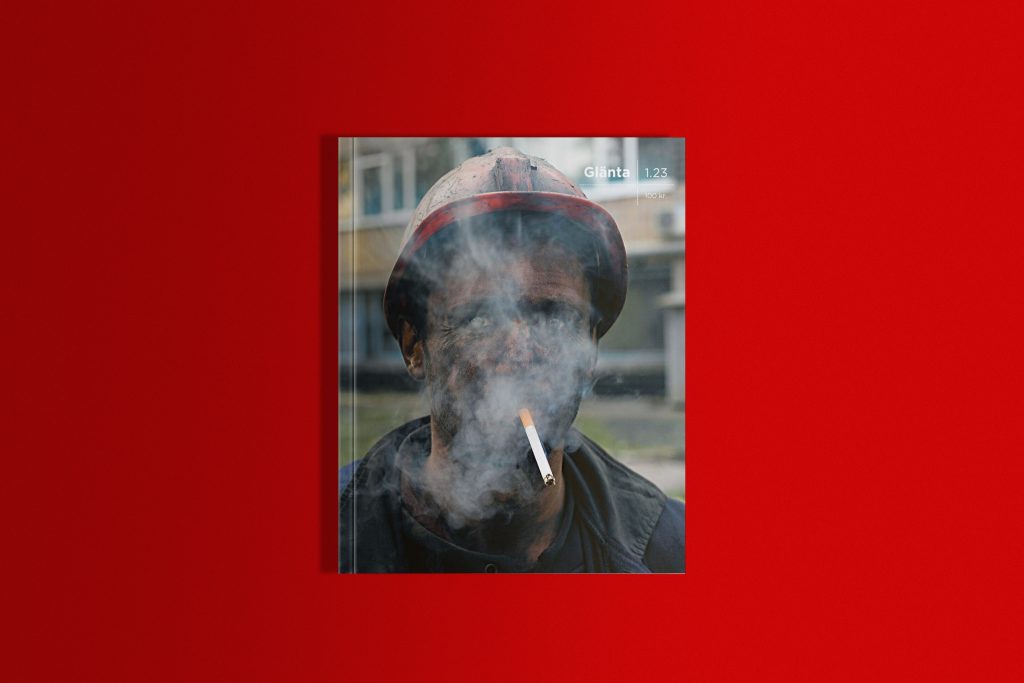In Glänta, Ukrainian journalist Olena Myhashko writes about how artistic ambitions crumble into dust when your country is at war. ‘When the war came, I switched to journalism with relief. Having visited the first de-occupied towns and villages as a reporter, I finally got rid of this embarrassing state of coming across as a cowardly thinker, a detached scholar – the last person to be rescued in a shipwreck.’
But though war makes art seem useless, it paradoxically kindles Myhashko’s longing to escape: ‘I saw no sense in contriving words or, what’s more, in pretending that they matter, since they could not become cured flesh or restored light. But at the same time, I was desperately lured by the idea of making a step further into any sort of dimension that was not mundane and real.’
Photography and memory
Katja Petrowskaja, a Kyiv-born literary scholar, writes regularly for Frankfurter Allgemeine Zeitung on the reality captured in photographs, many reflecting the Russian and Ukrainian past of her Jewish family. Ten of her short pieces are included in this issue of Glänta, illustrating one of the recurring themes of the issue: that freely created art has an incisive if limited role in understanding the actions of power.
One of Petrowskaja’s images shows Kyiv’s Maidan in summer of 1943, when the war had reduced the iconic Ginsburg and Parliament buildings to piles of bricks. She notes that her mother, a little girl of eight, saw her first and only execution among the ruins of Kyiv: twelve German war criminals were hung. ‘As the observer’s gaze moves from the twentieth century ruins to the still standing twelfth century cathedral, history is bypassed.’
A catastrophe and a massacre
Historian Maya Nomoto investigates an episode in Japanese history when the outcome of a natural disaster was made worse by a state-engineered rule of terror. On 1 September 1923, an earthquake ‘turned Tokyo into a living hell’. Large parts of the city collapsed, causing 140,000 deaths and making a million inhabitants homeless.
Emperor Taishō was supported by militarised ruling class, which idolised the empire and adhered to a variant of a Confucian moral code that permitted torture and executions of opponents. When pinning the cause of the disaster on the opposition didn’t calm public unrest, the regime blamed ‘godless’ Korean migrants. It worked: the outsiders were duly persecuted and killed.
Later generations apologetically instituted an annual Day of Remembrance. However, nationalism excuses everything: ‘year after year, Tokyo’s right-wing mayor has chosen not to attend the ceremony. Her silence supports the traditional strategy of letting the shadows cast by the natural catastrophe conceal the despotic acts of the state.’
The unfathomable society
Lawyer and writer Agri Ismaïl discusses the capacity of ‘the hidden state’ to record and hold on to data – and when it suits, to obscure those records too. Ismaïl describes how the state agencies managing the Manhattan Project (the US nuclear weapons programme during WW2) rose to the challenge of distracting the public gaze from an exceptionally large explosion. At first, denial and obfuscation worked remarkably well; but, later, phantoms – traces of radiation, implausibly high cancer rates – began to spook the official version of reality.
Scientists, statisticians and whistle-blowers sometimes expose what the state knows (or thinks it knows), but ‘we sense the unceasing presence of surveillance and have, perhaps, already begun to censure ourselves, hoping to placate the all-knowing Other’.
Apocalypse, Inc.
Erik Tängerstad analyses the twenty-first century role of mercenaries. Organised as professionally managed commercial enterprises, better funded and armed than many regular regiments, these militias operate outside international law. Tängerstad is interested in the financial and military activities of the Wagner Group, before and after Prigozhin, but begins with its American model, Blackwater PMC (Private Military Company or Contractor).
The business concept was created by Eric Prince, who retired after selling the majority shareholding in the now renamed Frontier Service Group (FSG) to a Chinese investment corporation. Dick Cheney and Donald Rumsfeld realized that Blackwater operatives were cost-effective alternatives to the US soldiers in Iraq and Afghanistan. Putin drew similar conclusions and used the Wagner Group to Russian advantage in Sudan, Syria and Ukraine.
In a long, intriguing aside, Tängerstad the military historian turns film critic: Apocalypse Now and Star Wars, he argues, were models for building empires using populist, profit-driven enterprises.







